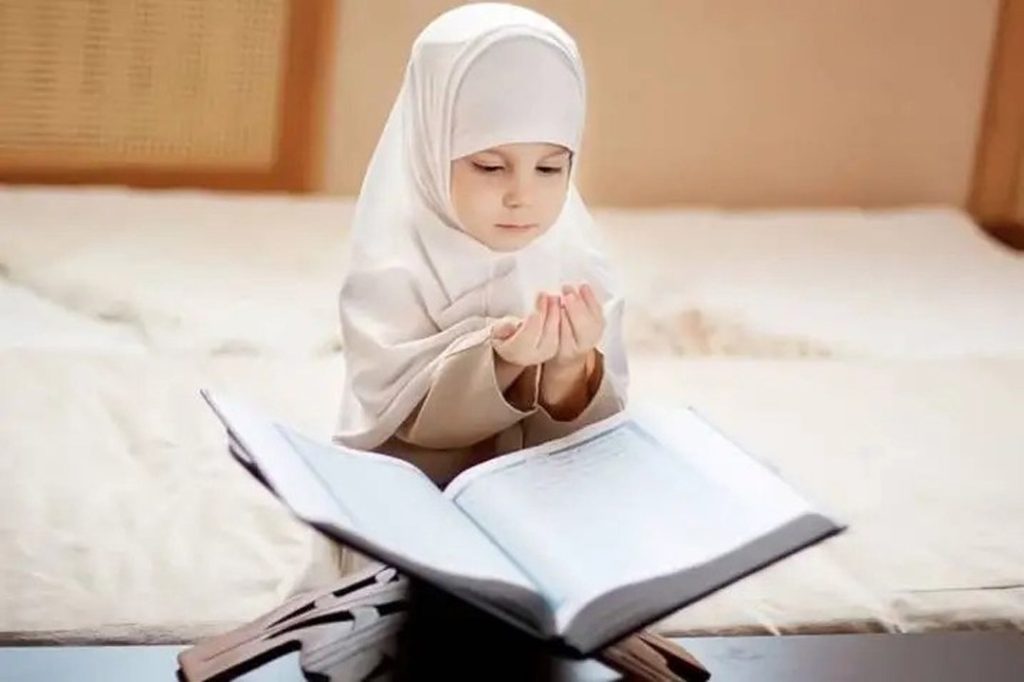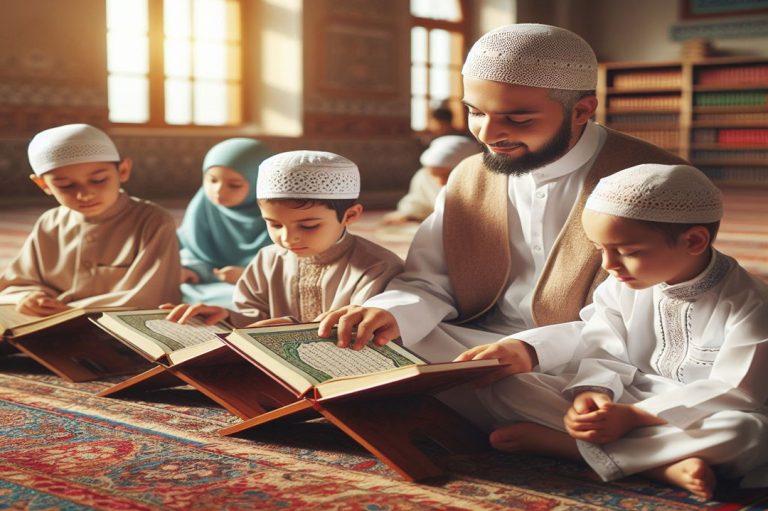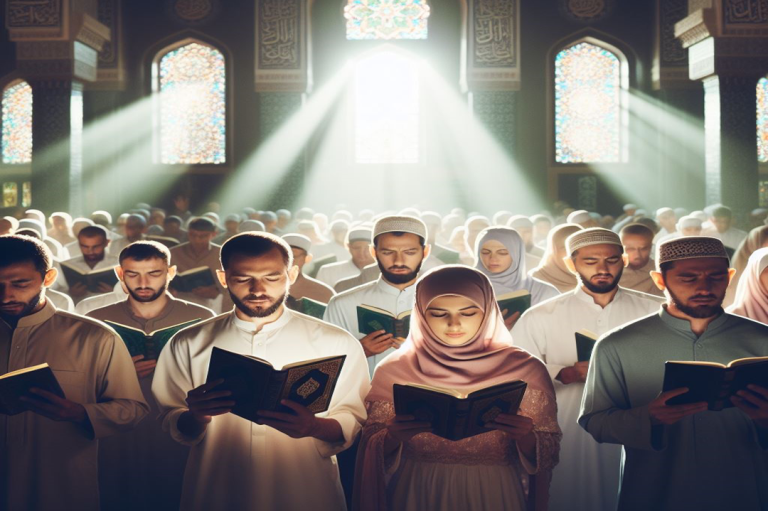Education has important role in improving the quality of a Nation. Good education can prepare human resources that can fight against other Nation all over the world in every aspect of life, such as economic, politic, and cultural development.
Table of Contents
ToggleQualified human resources can help the Nation to achieve their success. Therefore, they should be prepared well.
Qualified human resources can be achieved by facilitating good education for human from their early age, even when the infants are still in their mother’s uterus.
Teaching the Holy Quran for Muslim from their early life can help children improving their intelligent and Allah, the Almighty God would always save them.
Imam Thabarani, from Ali bin Abi Thalib stated that the messenger of Allah emphasizes to teach the Holy Quran to children, because children, or everybody who memorise the Holy Quran always gets protection from Allah, the Almighty God.
Many Islamic researchers state that listening to the Noble Quran not only improving the quality of human intelligence, but also developing psychic calmness, and faith.
Amka states that reading a Sacred Quran can give good effect of the reader’s body and soul such as give calmness effect; improving creativity; strengthen human body; good concentration; cure many kinds of diseases; give peace situation; reduce brain tension; reduce nervousness; avoid people from fear; strengthen personality and increasing language ability.
The above explanation indicates that teaching the Glorious Quran to young learners is very important to keep children healthiness, physically or mentally. Therefore, family, school, and society environments play important role in achieving the goal of teaching the Holy Quran to young learners. What is the right age to start teaching the Holy Quran to young?
learners, then? There is not clear cut age boundary to start with and to finish Quran learning.
The most important is the way to teach Quran to young learners.
Don Campbell stated that children brain capacity in their early age is generally influenced by condition and situation around them. Whatever they hear, listen, touch, feel, or elsewhere will influence the development and the capacity of their brain.
Therefore, adult who live around children must aware about this that they can help young learners to achieve optimal results in their physical and mental development by giving them appropriate ways or techniques in teaching and memorizing the Noble Quran.
To acquire optimal multiple intelligence of children, such as spiritual intelligence, emotional intelligence, social intelligence, intellectual intelligence and kinesthetic or physical intelligence, children should use their left and right hemisphere equally.
This can be achieved by teaching them the Holy Quran in their early age with appropriate methods or techniques.
To apply appropriate methods and techniques in teaching the Glorious Quran to young learners, a teachers of young learners should know the characteristic of young learners.
The teachers who know young learner’s characteristic will find it easy and enjoyable working with the children because they have the chance of becoming child again, of seeing the world through a child eyes.
Rasulullah (sallallahu alayhi wasallam) said: “the best of you are those
who learn the Holy Quran and teach it?
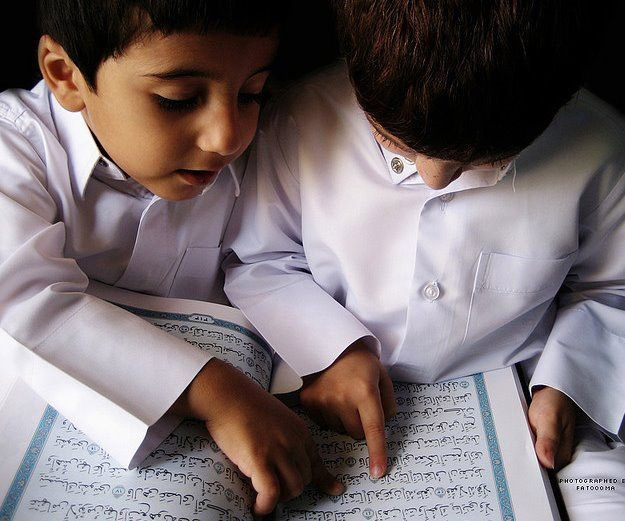
Some experts explain about young learners in similar point of view.
As Kasihani in Irlina define young learners as children aged between six (6) to thirteen (13) years old. Rixon, in Irlina defines young learners as children between 5 years old to 12 years old.
Purwaningsih in Irlina, states that young learner is learner in Elementary School aging 9-10 years’ old who are learning English as a foreign language.
Young learners according to the writer here are children who study at play group, kindergarten, and elementary school. Children aged between three (3) to twelve (12) years old.
Generally, young learners have characteristics such as like moving (they cannot be silent); like imitating everything; like argue at something; cannot differentiate between the right and the wrong one; like asking questions; memory is excellent; like playing; lake to be motivated (or target reward); like competition; like using their imagination; tend to have skill; can easily to acquire a new language; like puzzle and sensitive.
Young children learn differently from older children, adolescents and adults in several ways like respond to meaning even if they do not understand individual words and often learn indirectly rather than directly.
That is, they take in information from all sides, learning from everything around them rather than only focusing on the precise topic they are being taught.
Then, their understanding comes not just from explanation, but also from what they see and hear, and crucially have a chance to touch and interact with.
They generally display an enthusiasm for learning and a curiosity about the world around them.
They have a need for individual attention and approval from the teacher.
They are keen to talk about themselves, and respond well to learning that uses themselves and their own lives as main topics in the classroom.
They have a limited attention Span, unless activities are extremely engaging.
They can easily get bored, losing interest after ten minutes or so.
The above statements demand young learner teacher to employ several techniques or methods that interest children.
The teacher must prepare indoor and outdoor techniques or methods effective and joyful for young learners. Lots of short, simple activities are best suited to their attention span. Presenting some appropriate techniques or methods to read and to memorise the Holy Quran to young learners can help them to be able to read and memorise the Holy Quran faster and enjoyable.
Methods and Techniques of Teaching Recitation and Memorisation of Quran to Young Learners There are many kinds of methods that can be used in teaching recitation and memorisation of the Grand Quran to young learners.
Theoretically, the following methods the can be used.
A. Talqin and Takrir methods
To apply this method, a teacher presents the lesson by reading it, and the learners listen to it directly.
The teacher does not use a text, but he/she only memorise the lesson as well.
If the teacher writes something, it only to remain him/her from the learner’s mistakes.
also used to see the teacher’s lips to know the appropriate sounds of the Arabic alphabet.
Blind people usually use this technique to memorise the Noble Quran because this method does not need to read, the learners need only good listening and concentration.
B. Deposited Method
Deposited method is a method that is used by the learners in increasing the quality and the quantity of the learner’s memorisation .
The learner’s Quranic memorisation is reciting the Quran in each surah after memorizing it in front of the teacher individually.
According to Abdurrahman Abdul Khaliq, there are some techniques al Quranic memorisers can use in improving the quality of their memorisation of al Quran.
The techniques could be a learner should control him/herself the way to memorise al Quran, they do not need to memorise the Glorious Quran in the large portion once in a time; ascertain what day they memorise the Sacred Quran and what day they would repeat it; not allowed to memorise
another verse before the verse being memorised learnt by heart well; always recite the Holy Quran after completing memorizing it; begin to memorise the Grand Quran in his/her early life.
C. (repetition)
In this case, a learner individually repeats all of surah has been memorised in a month, in the last two or three month, even in a year.
This kind of technique had been done by the prophet Muhammad, p.buh in front of angel Gabriel every year.
The same technique had been done by the prophet best friends for generations. Raghib As-Sirjani further stated that there are some strategies can be applied in presenting repetition method, such as read the Holy Al-Quran most of the time; repeat to listen to the Holy Quran that has been memorised through media, like tape recorder, hand phone, or other recording; read surah or the verse that had been memorised when you are praying; and recite the verse artistically.
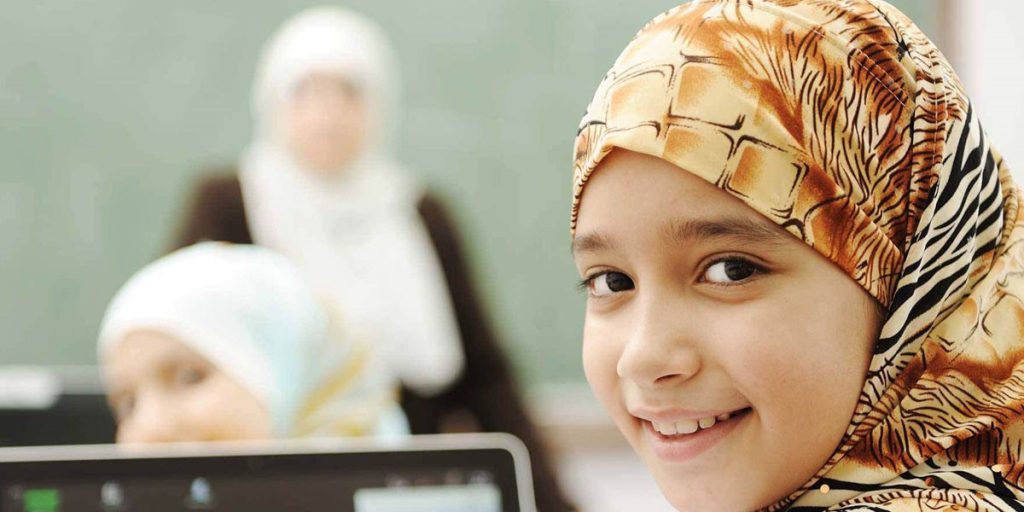
In addition, Raghib As-Sirjani explained that there are many ways that can support the learners in memorizing Al-Quran as in the following statement to prepare a good planning and make a group.
The statements assigned that the learners can actively memorise the Holy Quran effectively.
This is due to the way the learners of al Quran should Teaching the Holy Quran to Young Learners…
The ways are take al Quran whenever and wherever you are; to begin to memorise al Quran, a learner should begin from the simple verse to the complicated one; the long verse should be divided into part, so that the learners can easily memorise it; focusing our attention to meaning of verses; build a competition in memorizing Al-Quran Another method that can good to apply in teaching memorisation of the Holy Quran to young learners are each learner should be assigned a duty that will be especially his.
He should be required to bring it with him every day and to respect and care for it.
Be sure that the learners are always come to the class on time.
The learners should be assigned daily to the hifz school at least four hours. The largest number of students in each class is 20. Each learner should be asked to prepare three daily assignments; one of which will be done at home and the rest is in the mosque or in the classroom.
Many kinds of methods have been discussed above. Each has its own superiority and shortcoming.
What the writer has to emphasize here that whatever the methods and the technique is, the successful learners or teachers are those who learn and teach al Quran calmly, patiently and sincerely.
Because Allah, The Almighty God is always with everybody who learn and teach al Quran. Also Allah, The Almighty God sent al Quran to His Messenger, The prophet Muhammad, P.buh as “Rahmatan Lil Alamin”.
In conclusion, teaching the Noble Quran to your child is a profound responsibility that holds the potential to shape their spiritual, intellectual, and moral development.
By creating a conducive learning environment, tailoring your teaching approach, emphasizing understanding over rote memorisation , and modeling the values of the Grand Quran, you can equip your child with the tools and the passion to embark on a lifelong journey of Quranic literacy and spiritual growth.
